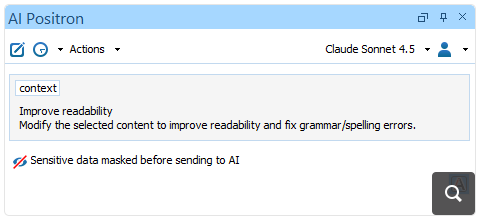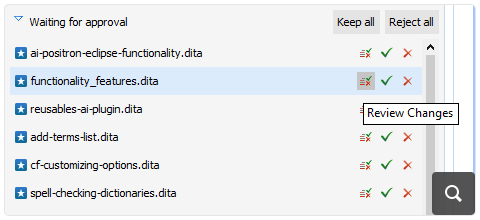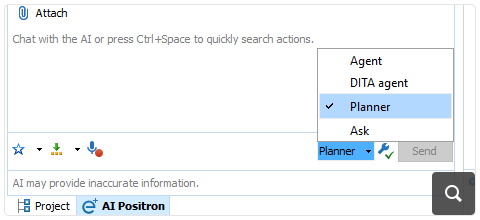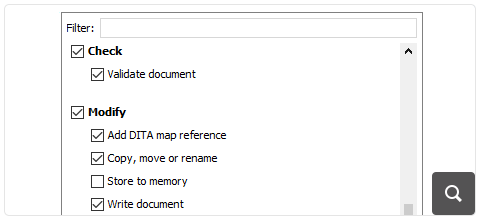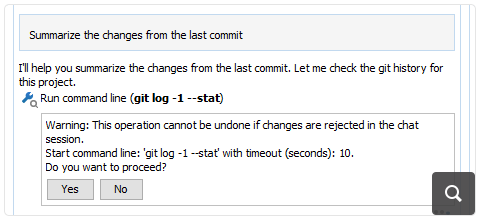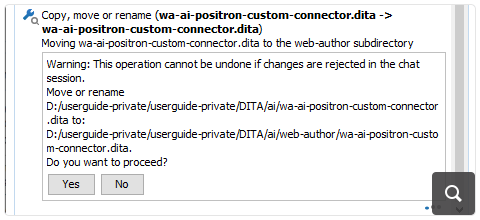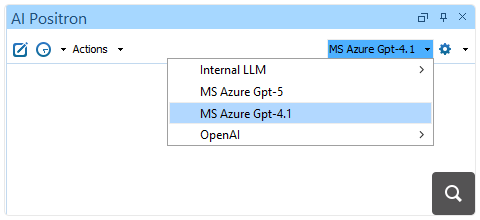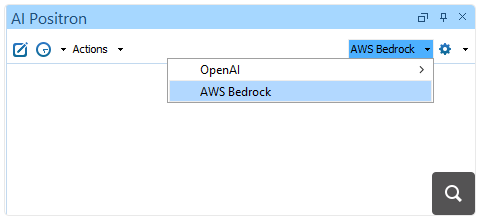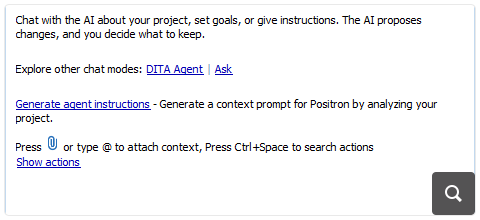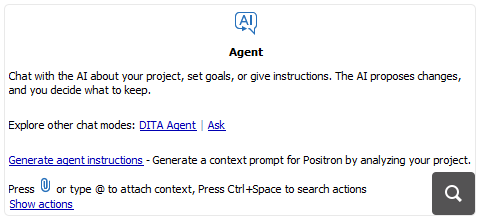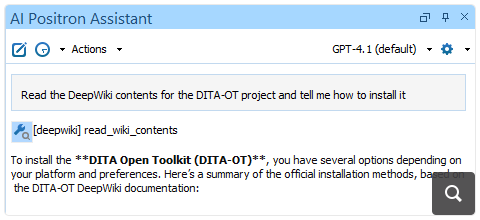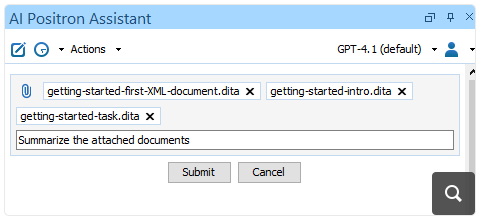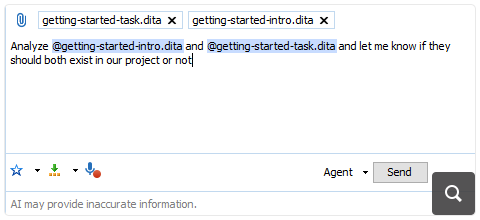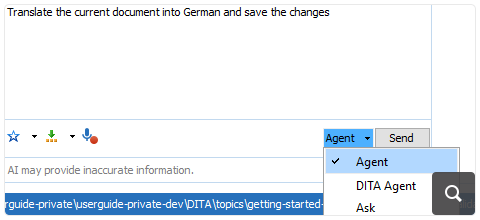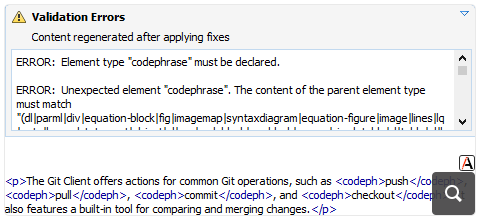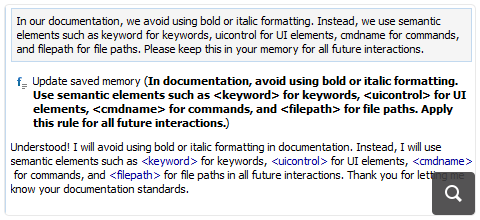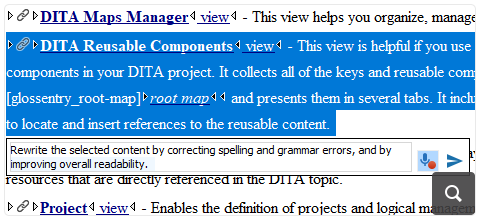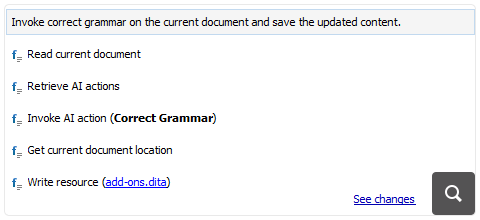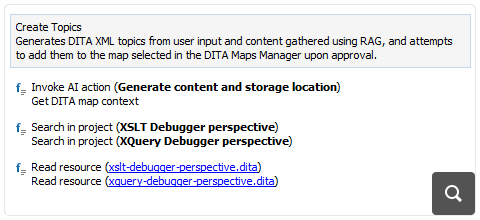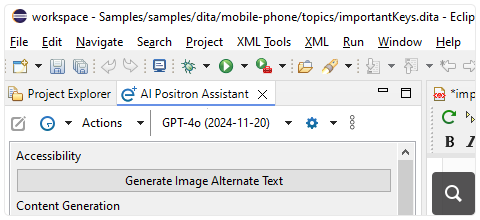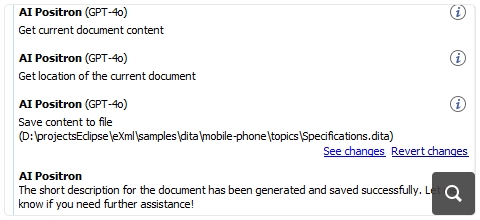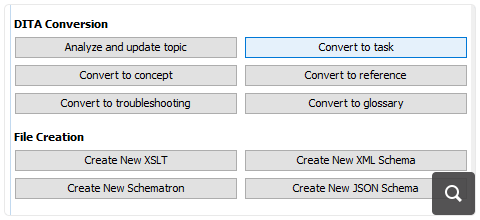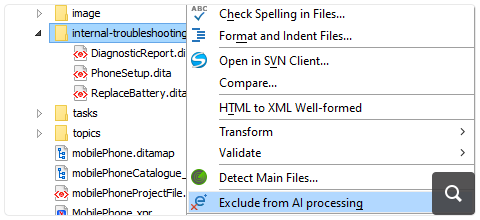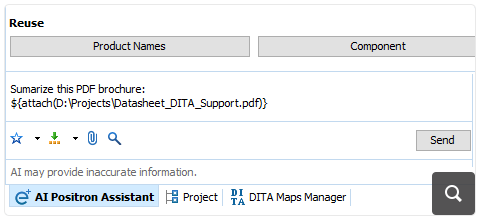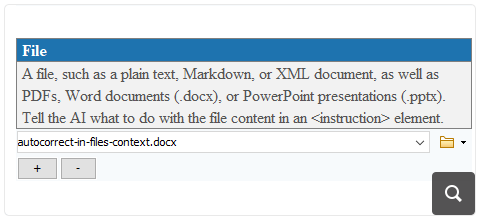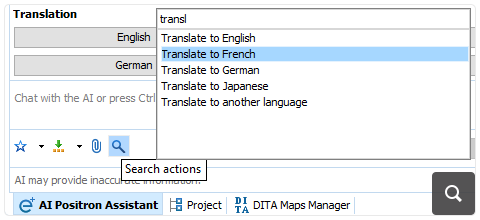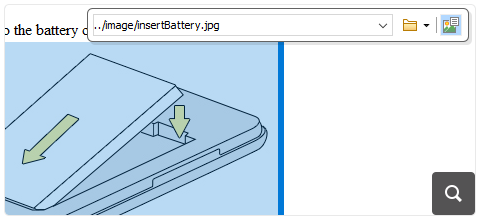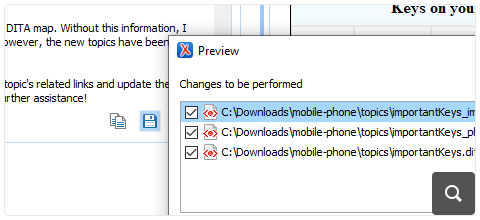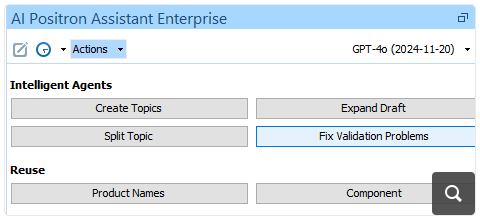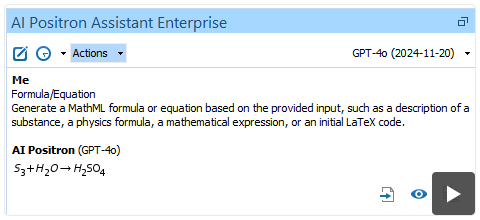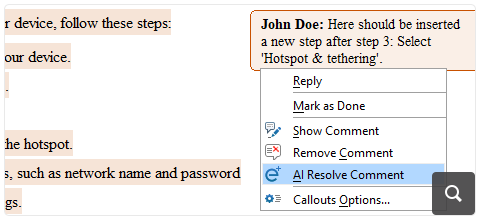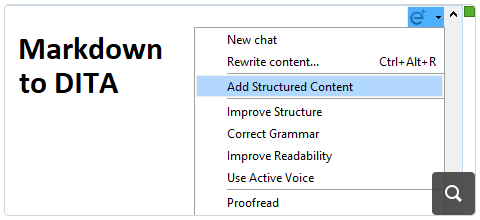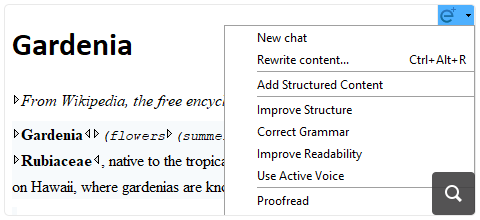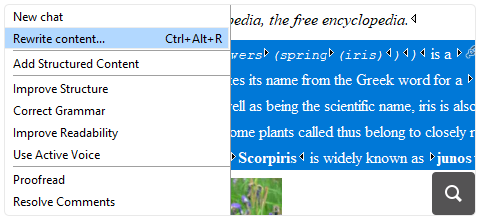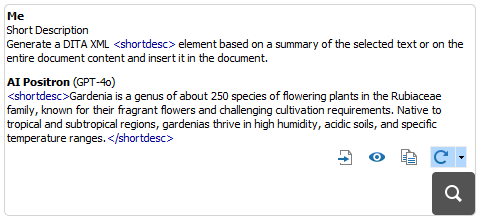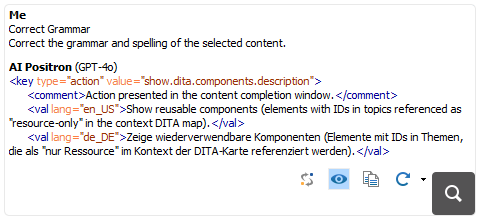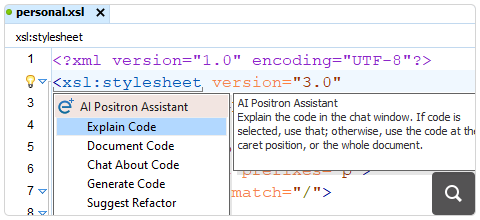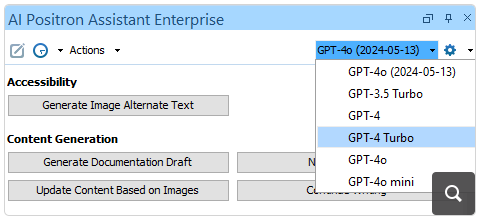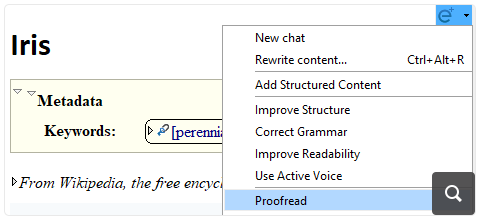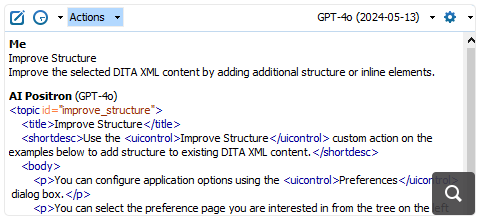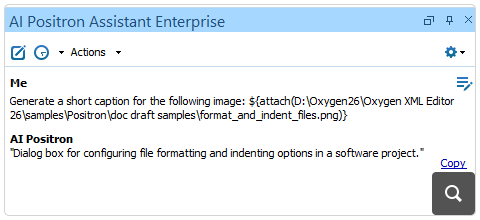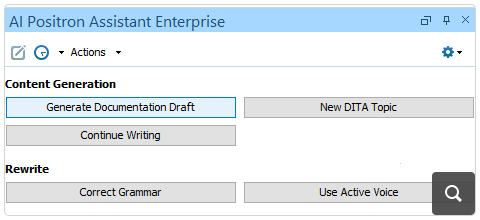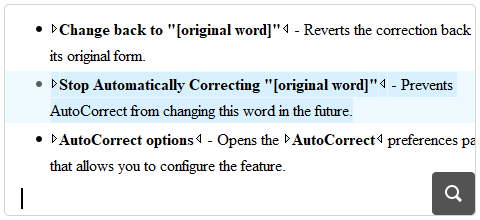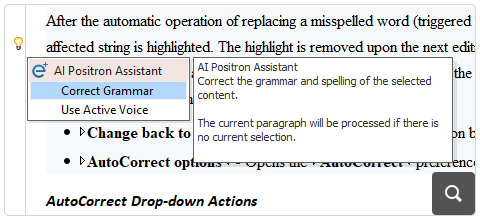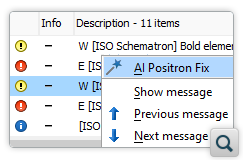Oxygen AI Positron 8.1 for Desktop
Oxygen AI Positron 8.1 for Desktop delivers a new level of
productivity, security, and flexibility for users leveraging AI in their XML authoring
workflows. This release introduces support for OpenAI’s latest GPT-5.2 and GPT-5.2 Thinking
models and enables more accurate and context-aware agentic tasks. Sensitive data masking is
now built-in, automatically protecting personal information in AI requests, with the ability
to extend coverage to custom data types. The review experience is streamlined as AI-modified
files are now presented directly in the chat for easy acceptance or rejection of changes.
Token consumption for AI prompts and tools has been optimized, reducing costs and improving
efficiency.
A new Planner chat mode empowers users to coordinate complex, multi-step, project-wide
changes, while smarter handling of PDF and Word attachments enables advanced document
processing. The chat interface now provides richer context about your editing environment,
leading to higher-quality AI responses. Users gain granular control over AI capabilities
with the new Tools selector, and can now create custom chat modes and actions, including
those with vision support for image analysis. Additional enhancements include agentic AI
Positron Fixes, improved alternate text generation for images, preservation of structure and
styles in attached documents, and new tools for command-line operations and resource
management.
Oxygen AI Positron for Desktop
OpenAI GPT-5.2 Models Available
The flagship GPT-5.2 and GPT-5.2 Thinking models, OpenAI's flagship models for
agentic tasks, are now available in the list of OpenAI models to choose from. The
Thinking variant is designed for complex tasks and multi-step decisions where accuracy
matters more than speed.
Sensitive Data Masking for AI Requests
Personal or private information (such as email addresses, phone numbers, IDs,
or API keys) is now automatically identified and masked in AI requests to help protect
sensitive data. You can extend this protection by adding custom patterns to cover
additional data types. The masked information is automatically restored in the AI
response, ensuring that users see the correct content and that any generated or updated
files remain accurate.
Improved Review Experience for AI-Modified Files
All files created or modified by AI now appear directly in the chat area, so
you can review the proposed changes and accept or discard them without leaving the
conversation. You can also open each file individually and accept only a subset of the
proposed changes while rejecting the rest.
Optimized Token Consumption for AI Prompts and Tools
The prompts and tools that the AI uses to generate answers have been improved
to consume fewer tokens/credits.
New Planner Chat Mode for Resource Consuming Tasks
The newly-introduced Planner chat mode is available for complex,
token-intensive operations (e.g. “Translate all files in the current folder” or “Find
all conrefs and replace them with conkeyrefs in userguide.ditamap”).
After being given the prompt, the AI explores your project, proposes a multi-step
plan, and after your approval, delegates each step to the most suitable AI agent. This
means large, project-wide changes can be coordinated without hitting LLM context limits,
while still showing you the tool calls and results for review.
Smarter PDF/Word Attachment Expansion in Planner Mode
When using the Planner chat mode with PDF or Word (.docx) attachments, the
document is automatically split into multiple Markdown files, with embedded images
extracted into a temporary folder. This allows the Planner to invoke sub-agents that can
process, transform, or convert the extracted files and assets as needed (for example,
converting them to other formats or generating new project structures).
More Context Information Available in Chat
The AI chat now automatically includes additional information about your
environment and editing context, such as the Oxygen application version, operating system
details, current date, main file information, and caret or selection data (Oxygen 28.1 or
newer). Having richer contextual information leads to higher-quality AI responses. For
example, when the AI needs to run a command-line tool, knowing whether you are using
Windows or macOS is essential to generate correct and relevant commands.
Tools Selector
You can now customize the AI's capabilities for each chat mode. The new
Tools selector allows you to disable or enable specific tools (either added
via Model Context Protocol or provided in the chat mode definition), giving you
more control to fine-tune the AI's responses and behavior for your specific
tasks.
Chat Selection Includes Images
When you use the AI chat with content selected in your document, any images
within that selection are now also included for the LLM to analyze along with the
text.
AI
Positron Fix Action
Turns
Agentic
The AI Positron Fix action now automatically applies proposed fixes directly in
your document and continues to explore additional sections when more context is
needed.
Documentation and APIs to Create New Chat Modes
You can now officially define new chat modes by creating new AI actions that
contain the "output-action": "agentic" property.
Tools to List and Invoke AI Agents
Tool to Run Command Line
A newly added tool is available in all chat modes and can be used to invoke a
command line process. Note that the tool needs explicit user approval when it is invoked.
For more details, see
AI Positron User Guide: Multi Purpose Tools.
Tool to Copy/Move/Rename Local Resources
A new tool is available in all chat modes and can be used to copy, move, or
rename a local file or folder path. When used in
Oxygen
28.1 and newer, if the
Main
Files feature is enabled in Oxygen, references to the moved or renamed resource
are also automatically updated. For more details, see
AI Positron User Guide: Tools that Change Content.
Control
AI Action Visibility
You can now choose whether a defined AI action is visible in the UI or only
available to other AI actions as a sub-agent by using the new
visibility
property. For more details, see
AI Positron User Guide: Visibility Property.
Create AI Actions with Vision Support
You can now decide whether a custom AI action sends both content and referenced
images to the LLM by using the "input-type": "markup-with-images" JSON
property. This helps you include images only when they are relevant for the AI
response.
Generate Image Alternate Text Improvements
The Generate Image Alternate Text action can now be used on
all images that are referenced within a document at once, while you can still use the
action on individual selections as well.
Preserve Structure and Styles for Attached Word and PDF Documents
When attaching Word (.docx) or PDF documents in the chat, their internal
structure (headings, lists, tables, code blocks) and styling (bold, italic) are now
preserved when being sent to the AI so that it better understands the
document.
Updated Model Context Protocol Library
The Model Context Protocol SDK that is bundled with AI Positron 8.1
was updated to contain the latest fixes in the 0.16.0 SDK.
Removed Support for Older Models
Support for older models (such as GPT-4, GPT-4 Turbo, GPT-4o, Sonnet 3.7, and
more) has been removed. Alternatives with improved characteristics are available, such as
models with higher intelligence, lower prices, or larger context windows.
Oxygen AI Positron 8.0 for Desktop
Oxygen AI Positron 8.0 combines the AI Positron Assistant and AI
Positron Assistant Enterprise add-ons into one unified add-on. This single installation
simplifies the setup process and makes it easier to get started.
AI assistance for authoring and development is now more effective. Project-aware prompts
created using the Generate agent instructions action and support for
multiple context files provide better guidance. New tools include project-wide search,
directory listing, and precise edit operations. You can also refactor XML directly from the
chat in Agent or DITA Agent modes.
You can now create multiple connections to each supported AI service provider, giving
you greater flexibility in choosing the right AI assistance for your tasks. The supported
connectors list has been enhanced with the addition of a dedicated AWS Bedrock connector.
Furthermore, new AI model options include OpenAI GPT-5.1, Claude Sonnet 4.5, Claude Haiku
4.5, and xAI Grok 4 Fast.
This version also introduces an experimental local Model Context Protocol (MCP) server
so desktop AI assistants can start the Oxygen application and validate, edit, and refactor
documents through Oxygen tools.
A New Unified AI Positron Add-on
The separate Oxygen AI Positron Assistant and Oxygen AI
Positron Assistant Enterprise add-ons are now combined into a single Oxygen
AI Positron add-on. The functionality specific to the previous Enterprise variant,
which allowed you to connect to your own AI provider, remains an enterprise-level feature that
requires an Enterprise license, either for the host application or for Oxygen AI Positron.
Previous users of both add-ons benefit from this unification: non-Enterprise users have more
functionality that was previously available only in the Enterprise version, such as the
Model Context Protocol (MCP) support, while Enterprise users will also be able to connect
to the Oxygen AI Positron Service as an AI provider.
Support Multiple Connections to AI Service Providers
You can now create multiple connections to supported AI service providers. This
allows you to access different AI models from various providers and switch between them
based on your specific task requirements, giving you more flexibility in choosing the
right AI assistance for your work.
New Dedicated Connector: AWS Bedrock
You can now connect AI Positron to the AWS Bedrock service
using a dedicated connector. Get instant access to enterprise-grade AI models with simple
API key authentication, real-time streaming responses, and multi-modal
capabilities.
Smarter AI Context Prompt Setup
You can now use the Generate agent instructions action
(available in the Welcome pane or in the Intelligent
Agents actions) to create a project context prompt. This prompt helps the AI
understand the structure and conventions of your documentation project, so that
AI-generated content matches your project’s specific organization, framework, and metadata
requirements. The generated prompt is saved as a Markdown file in your project and is used
by AI Positron when you use chat or other AI actions.
Edit Document Tool
When using agentic chat to make changes to topics, small changes (e.g.,
attribute values, spelling corrections) can now be made more easily by the AI engine using
the newly available edit_document tool that performs exact string
replacements in a specified file.
List Directory Tool
When using agentic chat, a new list_dir tool is available to
list the contents of a directory, which helps the AI understand the structure of your
project.
XML Refactoring Tools in Chat Modes (Oxygen 28.0 Required)
XML refactoring tools are now available in the Agent and DITA Agent chat modes.
This lets you quickly restructure your XML content, such as adding, removing, or moving
elements and attributes, or applying custom XSLT transformations, without leaving the chat
interface.
Project-wide Search Tool (Oxygen 28.0 Required)
The new grep_project tool allows the AI to quickly find
precise matches across your project files. It supports wildcards (for example,
*.dita), regular expressions, and XPath filters, making searches both
flexible and powerful. By leveraging this tool, the AI can efficiently explore your
project, resulting in improved performance on complex agentic tasks.
AI-Powered New File Creation (Oxygen 28.0 Required)
When creating a new file in Oxygen, you can enter a prompt in the new AI
prompt input area and attach relevant text files (plain text, XML, Markdown),
images, or documents (PDF, Word, PowerPoint) to guide the AI in generating content for
your new file. The generated output appears in the AI Positron chat view, where you can
continue the conversation to refine it further, if needed.
Chat Welcome Screen
A useful welcome screen is displayed before you start a chat with the AI. It
contains general instructional information and links to quickly change the chat mode
(Ask, Agent, or DITA Agent). There is
also a Show actions link that you can use to see the list of all
available predefined AI actions.
Oxygen XML as a Local Model Context Protocol Server (Experimental, Oxygen 28.0
Required)
You can now configure Oxygen XML as a local Model Context Protocol (MCP)
server, allowing AI assistants (such as Claude Desktop) to start the Oxygen XML
application and to interact with the Oxygen XML tools, for example to invoke tools for
validating, editing, and refactoring XML documents.
Model Context Protocol Improvements
The
Model Context Protocol integration now provides more
configuration options. You can specify header values for the connections that use the
Streamable HTTP protocol, for example to pass an "Authorization" header, and
use editor variables to access environment variables or system properties. It is also
possible to define input fields, allowing the application to ask for a value, such as an
access token, instead of storing the value in the configuration file. For security
reasons, each tool call to an MCP server requires user approval to run.
More
information about MCP integration is available at:
https://www.oxygenxml.com/doc/ug-positron-desktop/ai/model_context_protocol_preferences.html.
Autocomplete Development Action (Oxygen 28.0 Required)
A new AI Autocompletion support provides real-time, context-aware code and
markup suggestions as you type, at the caret location. It can also be triggered on request
using the Autocomplete action. In this latter case, the chat view will
show the action and you can further refine its result if needed.
Generate Code Improvements (Oxygen 28.0 Required)
The Generate Code development AI action now provides the
structure of the associated XML file in the prompt, ensuring better results. For XSLT and
XQuery, it includes the structure of the XML document associated in the transformation
scenario, while for schemas (XSD, Schematron, DTD, RNG, RNC), it includes the structure of
an instance that has the schema associated in a validation scenario.
Enhanced Project Content Search Options (Oxygen 28.0 Required)
When the AI searches for related content in your project it is provided with
tools that have parameters to specify the page size, page number, and whether to match all
or only some of the keywords. This gives more flexibility when AI is retrieving relevant
documents from your project.
OpenAI GPT-5.1 Models Available
The flagship
GPT-5.1 and GPT-5.1 Thinking models are now available in the list of OpenAI
models to choose from.
xAI Grok 4 Fast Models Available
The latest fast
models for xAI
Grok are available to choose from, including
Grok 4 Fast and
Grok 4 Fast (Non Reasoning).
Claude Sonnet 4.5 Model Available
The
Claude
Sonnet 4.5 model (listed as their strongest model for building complex agents) is
now available in the list of AI models to choose from.
Claude Haiku 4.5 Model Available
The
Claude
Haiku 4.5 model (listed as their latest small model) is now available in the list
of AI models to choose from.
Improved
Tool Names and Descriptions
All the names and descriptions of tools that are available in the chat or AI
actions were improved for greater accuracy and relevance. This allows the AI to better
decide what tool to call and what parameters to pass, thus improving the agentic AI
workflows.
Additional Context Files
The main AI Positron Preferences page now allows you to specify multiple
context prompt files that contribute to the project context prompt for all chat sessions
and AI actions, leading to more relevant and useful responses from the AI.
Custom Actions Prioritized
Your custom actions are now displayed before the built-in actions wherever AI
actions are shown, so you can access them more quickly.
Oxygen AI Positron 7.0
September 15, 2025
The latest release of the Oxygen AI Positron Assistant for desktop
tools introduces support for OpenAI's cutting-edge GPT-5 models,
enhancing AI capabilities for chat and AI actions. The release includes the ability
to invoke tools defined on Model Context Protocol Servers, ensuring seamless
integration with external AI-powered tools. AI-powered automatic fixes now ensure
XML documents remain valid when an invalid or not well-formed document is generated
by the AI model. Additionally, you can now manage attachments using visual chips,
paste screenshots directly into the chat for better context, and edit attached
resources from prompts that have already been sent to the AI. The introduction of
multiple chat modes, the new search_in_project tool, and improved
handling of Word (.docx) attachments further enrich the user experience.
There are changes in:
Oxygen AI Positron Assistant
Support for OpenAI GPT-5 Models
After configuring the OpenAI connector, you have access to the
latest GPT-5 models, including GPT-5 (with default or minimal
reasoning), GPT-5-mini, and GPT-5-nano, in the Chat view. This gives
you access to improved AI capabilities for chatting or invoking AI actions.
Invoke Tools Defined on Model Context Protocol Servers
The Anthropic
Model Context Protocol (MCP) is an open standard that
enables developers to build secure, two-way connections between their data sources and
AI-powered tools. You can now configure a reference to a MCP configuration file in the AI
Positron Assistant's
Model Context Protocol preferences page. The
AI Positron
Enterprise add-on utilizes this file to load extra tools that can be called by the
AI engine when using the chat modes or invoking custom AI actions.
AI-powered Automatic Fixes for Invalid XML Responses
When an invalid or not well-formed XML document is generated by the AI model,
Oxygen AI Positron automatically detects the document type, validates the document, and
tries to correct any detected errors, thus ensuring that the generated XML documents are
valid.
Fix Validation Problems in the Editor with AI Positron Fix
You can fix validation problems in the editor (Text and Author modes) with the
AI Positron Fix action, available in the Quick Fix menu and in the
tooltip when you hover over a validation problem. This helps you resolve issues faster
without leaving your editing context.
Attach Files to Edited Message Prompts
When editing a message prompt that was sent to the AI, you can use the
convenient Attach action to attach images (in PNG or JPEG format) or
files (in various formats including plain text, XML, Markdown, Word, Powerpoint, or PDF).
This allows you to provide additional context, helping the AI generate more relevant
responses.
Manage Attachments with Visual Chips
You can now see your attached files as chips in the chat input
area, making it easy to review and remove individual attachments. If you want more
control, you can optionally use @ to reference specific files in your
instructions. Unreferenced attachments are still included automatically at the end of
your message.
Attachments are also displayed as chips in the chat, so you can quickly identify and
access files sent to the AI.
Additionally, when you select content in the editor, a chip named
selection appears in the AI Positron chat input area. It represents
your current selection and updates whenever you change it. You can reference it by
typing @selection.
Paste Screenshots into Chat
You can now paste a screenshot directly into the chat input area to share
visual context with the AI and reduce the need to retype details.
Multiple Chat Modes
You can now choose between three chat modes in the Chat view:
- Agent - Discuss your project, set goals, or give
instructions. The AI proposes changes and you are required to review and approve
them.
- DITA Agent - Specially tuned for DITA-specific projects,
provide goals or instructions and let the AI explore your project and apply
project-wide changes with your approval.
- Ask - Get answers and explanations from the AI. This
read-only mode uses search tools when needed and does not change your
files.
All modes automatically use your current context (project location, current document
and type, and the DITA map in scope), so you don’t need to include this information in
your prompts.
Flexible OAuth2 Configuration via the Positron Custom Connector Add-on
Use the
Oxygen AI
Positron Custom Connector add-on to connect the Positron Assistant
Enterprise plugin to AI services that expose a REST API (for example, OpenAI-compatible
endpoints). You can now configure the OAuth2 token endpoint with the
POSITRON_CONNECTOR_AUTH_TOKEN_URL environment variable and set the
OAuth2 scope with
POSITRON_CONNECTOR_AUTH_SCOPE. This lets you use
identity providers that require custom token URLs or scopes.
Improved Word (.docx) Attachment Handling
When you attach a Word (.docx) file, the text and images are kept in their
original order. This preserves the document’s structure and context, so you get more
accurate responses.
Dedicated Connector for xAI Grok
You can now connect the Enterprise distributions of Oxygen AI Positron
Assistant to the xAI Grok service using a dedicated
connector.
Search In Project Tool
The new search_in_project tool allows the AI to quickly find precise
matches across your project files. It supports wildcards (for example,
*.dita), regular expressions, and XPath filters, making searches both
flexible and powerful. With this feature, the AI can ground its answers in your project
content.
Debug Custom AI Action Prompts
For debugging custom AI action prompts, you can see the exact prompt that is
sent for any custom AI action (in the Chat view) by setting the
oxygen.ai.positron.development.mode system property with the value of
true in the parent Oxygen application.
New XSpec Template for Testing AI Actions
Use the new AI Action Test file template to create XSpec tests
that validate your AI actions. It includes a commented skeleton that shows where to define
inputs and expected results.
Enhanced Generate Code Experience
Easily generate code directly within the editor by pressing Ctrl +
G (Command + G on macOS). This shortcut instantly opens a
convenient text field at the cursor location, allowing you to describe the code you want
to generate without interrupting your workflow.
Flexible AI Validation and Correction Controls
You now have separate controls for automatic validation and correction in AI
Positron Preferences. Choose whether the AI attempts to fix validation errors in complete
XML documents it returns, well-formedness errors in XML fragments it returns, and
validation errors when AI-generated XML is inserted into your document. This lets you
control when automatic fixes happen and avoid unwanted changes.
Oxygen AI Positron 6.0
July 3, 2025
All Oxygen AI Positron Assistant 6.0 distributions feature the advanced GPT-4.1
OpenAI model as default. All AI action prompts were reviewed and improved for better
quality, consistency, and reuse. The users of the Enterprise distribution benefit
from new connectors for Google Gemini and Vertex AI, as well as enhanced Microsoft
Azure OpenAI integration and simplified configuration.
Oxygen AI Positron Assistant (for Oxygen desktop tools) brings automatic
validation and correction of AI-generated content, and smarter document context
expansion for the AI Positron Fix action. User preferences and rules can be saved as
persistent memories,the AI context can be supplemented with additional files
automatically, or by manually attaching files to conversations, and prompts can be
entered using voice input. AI actions can be invoked directly from chat, just by
referring to them, the Improve Readability action now supports audience level
customization, and AI development actions are available for more document
types.
There are changes in:
Oxygen AI Positron Assistant
Default OpenAI Model Updated to GPT-4.1
The GPT-4.1 model is now the default OpenAI model you
use with the AI Positron Assistant. With GPT-4.1, you can process larger
documents more quickly and at a lower cost, while receiving more accurate and
relevant responses. You can also choose GPT-4.1 Mini or
GPT-4.1 Nano for specific tasks.
Improved All AI Action Prompts
Prompts for all pre-defined AI actions have been optimized for greater
accuracy and relevance. They are now developed using the DITA XML standard,
enabling content reuse for more consistent prompts that follow similar patterns
and structure.
Automatic Validation and Correction of AI-Generated Content
By default, AI-generated content is automatically validated when it is
inserted into your document. If errors are detected, the AI now automatically
tries to correct them. You can control this feature using the new Allow
automatic validation and correction of AI-generated content option
in the AI Positron Assistant preferences page.
AI Positron Fix Uses More Context
The AI Positron Fix action, which helps you resolve
validation problems in your documents, now automatically analyzes a larger
section of your document when needed. If the initial context is not enough, the
AI expands its analysis to provide better solutions for complex
issues.
Rules Saved as Persistent Memories
You no longer need to repeat your preferences or rules in every
conversation with the AI engine. When you ask the AI to remember specific rules
about your activity or profile, it saves them in the Saved
Memories preferences page and automatically applies them in all
future interactions. This ensures your instructions are always followed, making
your experience more consistent and efficient.
New "Additional Context File" Setting
The Context setting in the AI Positron Assistant
preferences lets you provide project details that help the AI generate more
relevant and personalized responses. You can now reference a file in the
Additional context file setting to supplement the
Context information. This allows you to include more
detailed or project-specific information in all AI action prompts.
Attach Files to AI Conversations Using Drag and Drop or Copy/Paste
You can now attach files to your AI conversation by dragging, or by
copying and pasting them into the chat input area. This makes it faster to share
relevant documents and provide context for your AI interactions.
Record Prompts with Your Voice
Record prompts by speaking instead of typing. This option is available
at the bottom of the AI Positron Assistant view and in the
dialog box when you use the Rewrite Content action, making it
faster to provide input. In the Enterprise version, you may need to configure
connector-specific parameters to enable voice recording.
Refer AI Actions in Chat Prompts
You now have the possibility to instruct the AI to invoke the existing
AI actions in order to perform more complex tasks. For example, to correct the
grammar and update the current document, you could type: Invoke correct
grammar on the current document and save the updated content. This
approach streamlines your workflow by letting you quickly apply changes or
transformations in one place.
Grouped Function Call Information
When the AI uses function calls, they are now grouped. You can hover over a function
call button to see its details, including key parameters. If the function reads
or writes content, you also get inline links to the target resource, making it
easier to track and review important information.
Compact AI Message Presentation
You see AI messages in a more compact format, allowing you to view more
content at once and reducing scrolling, so you can review conversations more
efficiently.
Uninterrupted AI Chat When Switching Editors
The AI chat in the Positron view now stays active when you switch
between editors. If the AI is generating content, it no longer stops when you
open or close editors, so you can continue your conversation and use the AI's
output across different editors.
New AI Connector for Google Gemini
You can now connect the Enterprise distributions of the Oxygen AI
Positron Assistant to Google Gemini service, so you can use Gemini's AI
capabilities directly within your content creation workflows.
New AI Connector for the Vertex AI Service
Connect the Enterprise distributions of Oxygen AI Positron Assistant to
Google Cloud’s Vertex AI, a platform for building and deploying machine learning
models, by installing the Oxygen AI Positron Vertex AI
Connector add-on. This lets you use your custom or pre-trained
Vertex AI models directly in Oxygen to generate and enhance content with
AI-driven suggestions and automation.
Connect with Microsoft Entra ID to Microsoft Azure OpenAI Connector
The Microsoft Azure OpenAI connector now supports OAuth 2.0
authorization code flow, allowing you to sign in using your browser. You can use
single sign-on and multi-factor authentication, and manage permissions centrally
through Microsoft Entra ID for improved security and easier access
management.
Simplified Configuration for Microsoft Azure OpenAI
You can now use the base endpoint for both text and image processing
with the Microsoft Azure OpenAI connector, so you no longer need to manage
separate settings for image analysis. This makes setup faster and
easier.
Configure the AI Service Using a JSON File
You may configure the AI Service used by Oxygen AI Positron Assistant
Enterprise add-on by placing a JSON file in the installation directory. This
file specifies the AI connector and its parameters, allowing you to automate the
initial setup and prevent users from changing the configuration in the
preferences page.
Specify Audience Level for the Improve Readability Action
You have the possibility to invoke the Improve Readability
action for a specific audience level (Beginner,
Intermediate, Advanced, or Expert) by
hovering over it and clicking the Customize button. This lets you
tailor the AI's response to match your audience's level of
expertise.
AI Development Actions for More Document Types
You can use AI development actions (Generate Code,
Explain Code, and Chat About Code) with
additional document types, including HTML, XHTML, XProc, and XSpec. This makes
it easier to generate, review, and discuss code across a wider range of
documents.
Create Custom AI Actions More Easily
You now have access to official
documentation with snippets and examples to help you create custom AI
actions. All supported properties for AI action JSON configuration files have
been revised and simplified. Meanwhile, older AI action definitions can still be
loaded.
Oxygen AI Positron Assistant 5.0
April 24, 2025
There are changes in:
Oxygen AI Positron Assistant
AI Positron Assistant Now Available in Eclipse Plugin Distributions
The AI Positron Assistant plugin is now available in the
Eclipse plugin versions of Oxygen XML Editor/Author/Developer. After
installing the AI Positron Assistant plugin in the Eclipse version of
Oxygen, the AI Positron Assistant view is accessible along with its
various AI features.
Create Files with AI
The new AI actions in the File Creation category allow you to
generate various files based on a text description you provide. You can create new
XSLT, XML Schema (XSD), Schematron,
JSON Schema, and Document Type Definition (DTD) files.
These actions save you time by providing some of the structure for you, streamlining your
document creation process. The new file wizard also contains AI-powered new document
templates for easily creating these same types of files.
AI Creates and Updates Files with User Control
The AI Positron Assistant has the ability to utilize a
save_document callback function to create new files or to update
existing files while keeping you in control. You can view the changes in the built-in
visual file comparison tool and choose to accept or revert them, ensuring that you
maintain oversight over your documents.
AI-based DITA Conversion, Analysis, and Update Tools
Transform existing documents or DITA topics into various specialized DITA types
(Task, Concept, Reference, Troubleshooting, Glossary). Also, an AI-powered analysis action
can restructure topics by dynamically splitting the document into parts and applying the
conversion to the appropriate topic types for each part.
Exclude Resources from AI Processing
You can now specify files or folders to exclude from AI processing by adding
them to a .ai-ignore file. You can easily add resources to the ignore
file by using a new contextual menu action (named Exclude from AI
processing) that is available in the Project view,
DITA Maps Manager, and the Text and
Author pages of your current editor.
Attach Word, PowerPoint, and PDF Files
You can now attach Word (docx), PowerPoint (pptx), and PDF documents in the
Chat view, allowing you to provide more context to the AI. This enhances the accuracy and
relevance of AI responses by utilizing text and images (images are supported for Word and
PDF) from these documents.
Generate Documentation Draft Can Read External Files
The Oxygen AI Positron Assistant provides the ability to generate a
documentation draft as a DITA topic based on a configuration file that tailors the draft
generation process using a provided title and summary, as well as information that can
specify the context, target audience, instructions, images, and related topics. You can
now add also references to external files that contain relevant information for generating
the new draft. These files can be in plain text format (including Markdown or XML) or
document format (PDF, Word, PowerPoint). This enhancement helps you create more
comprehensive and contextually accurate documentation by incorporating additional
resources.
Reasoning Models in AI Positron Service
You can now access powerful reasoning models from Open AI, o3
, o1, o4-mini, and o3-mini, in the AI
Positron Assistant when connecting to Oxygen AI Positron Service. These models help you
solve complex problems across various domains, enhancing your problem-solving
capabilities.
Integration with xAI Grok
For the AI Positron Assistant Enterprise add-on, the OpenAI connector was
tested and modified to allow connecting to the xAI Grok AI engine,
enhancing integration capabilities.
Quickly Find AI Actions
Search for AI-powered actions using the Search actions button
or the Ctrl + Space shortcut, saving time by quickly locating the actions
you need.
Generate Image Alternate Text from the Floating Toolbar
You can now access the Generate Alternate Text action directly
from the floating toolbar that appears when you select an image, streamlining the process
of adding alternate text and enhancing your workflow efficiency.
Improved Resolve Comments Action
The Resolve Comments AI action now retrieves content from your
current document to offer better results when the provided content is unclear or
incomplete. This enhancement helps you resolve comments more efficiently and accurately,
boosting your overall productivity.
Performance Optimization for Fix Validation Problems
Experience faster performance and reduced token consumption with the optimized
Fix Validation Problems AI action, resolving issues more
efficiently.
New AI Callback Functions for Dynamic Workflows
You can now use new AI callback functions (which are specialized mechanisms
enabling the AI to dynamically invoke external processing) to create dynamic workflows by
connecting with external tools and validating documents. These functions automate tasks
and improve efficiency in your custom AI actions.
get_related_content_from_specific_feedback_site - Retrieve content
from a specified feedback site using an Oxygen Feedback WebHelp token. This function
is available when external retrieval sources are enabled in your preferences. validate_current_document - Validate your current document and
receive a list of any validation issues, allowing the AI to suggest fixes for the
detected errors. term_check_document_content - Check specified content for terminology
issues and get suggestions based on rules from the Oxygen Terminology
Checker, ensuring consistency in your documents. term_check_current_document - Check your current document for
terminology issues and receive suggestions based on rules from the Oxygen
Terminology Checker, helping you maintain quality and consistency. - The
get_content_for_document_url and
get_current_document_marked_up_content functions can now be used to
retrieve content with line numbers included.
Distribute or Filter AI Actions via Plugins and Frameworks
In Oxygen 27.1 or newer, plugins or frameworks may contain a folder named
ai-positron-actions where AI actions are automatically loaded from. A file
named excluded-action-ids.txt may also be placed in the same folder to define
action IDs (on a line-by-line basis) that should be filtered out from the UI, useful for
actions intended to be used in a different context, not directly invoked by the
user.
Reference Prompt Files in AI Actions
Use the prompt_ref JSON property to reference external text or
Markdown files for prompts, allowing for more flexible AI action
configurations.
Integrate Custom AI Connectors and Custom Callback Functions
You can now extend the Oxygen AI Positron Assistant by integrating custom AI
connectors and callback functions. This allows you to connect with AI providers not
covered by our built-in options and create custom interactions with AI engines. These
extension points are already utilized by some of our add-ons, such as the Oxygen
AI Positron Custom Connector and the Terminology Checker
plugins, enhancing your AI integration capabilities.
New AI Custom Connector Add-on
You can now integrate with a custom AI service using the new Oxygen AI
Positron Custom Connector add-on. This add-on allows you to connect the
Oxygen AI Positron Assistant Enterprise plugin with AI services that
expose a REST API, similar to OpenAI's chat-completion API. Unlike the built-in Open AI
connector, this add-on supports the OAuth Client Credentials Flow for
authentication and gives you more flexibility by letting you set query parameters.
Translated AI Actions
The categories, titles, and descriptions for the AI Positron default actions
are now translated into the supported languages available for the user
interface.
GPT-3.5 Turbo Model Removed
The GPT-3.5 Turbo AI model was removed since OpenAI recommends
use of GPT-4o Mini model instead, that is cheaper, more capable,
multimodal, and just as fast.
Oxygen AI Positron Assistant 4.1
The Oxygen AI Positron Assistant add-on is a powerful tool that helps
users increase their productivity by providing support for using AI-generated content.
Version 4.1 introduces some helpful new AI-powered actions to fix
validation problems, generate MathML formulas, and generate XML comments for annotating
code.
Some of the intelligent agent actions were upgraded to enhance their functionality. The
Resolve Comments AI action is now accessible directly from the editor or
Review view, making it a breeze to resolve all comments in a document with AI assistance.
Message labels were also improved to indicate when submitted content requires no AI changes,
new functions were implemented, and some features were added to assist with debugging and
for security purposes.
There are changes in:
Desktop
Preview All AI-Proposed Changes to Files
You now have the ability to preview all the changes in the documents that the
AI proposes to create or update while processing particular actions (e.g. Split
Topic or Create Topics). You are no longer required to confirm
that you want to overwrite files. Instead, you can preview the proposed changes in all
files and choose how to proceed in each instance. This helps to ensure control over
AI-proposed modifications.
Notification for Unchanged Content
When an AI action processes content but does not result in any changes, you are now
informed, eliminating the need for unnecessary previews or visual inspection. This
improvement saves time and ensures a smoother workflow.
Fix Validation Problems
The Intelligent Agents category now includes a new Fix
Validation Problems action. This action validates the current document and
suggests fixes for all identified issues, streamlining both the validation process and the
resolution of validation problems, ensuring high-quality content.
AI-based MathML Generation
The new Formula/Equation action (located in the Content
Generation category) leverages AI to generate MathML formulas based on your
descriptions. This feature simplifies the creation of complex mathematical
representations and enhances technical documentation workflows.
AI-based Code Annotations
The new Annotate Code AI action (located in the
Development category) can be used to generate XML comments within the
code found in the current selection, at the cursor location, or in the whole document. The
generated annotations explain key concepts of the code. This action is available for XSLT,
Schematron, and XSD documents.
Resolve Comments from Contextual Menu
Invoking the Resolve Comments AI action is much more efficient
as it now appears directly in the contextual menu when you right-click a comment callout
box in the editor or in the Review view. The action changes the selected content based on
the suggestions within comments and then removes the comments.
New AI Callback Functions to Enable Dynamic Workflows
The plugin now includes several new AI callback functions, which are
specialized mechanisms enabling the AI to dynamically invoke external processing and use
the results in generating its response. These new functions can be used to invoke another
AI action, to find all the available AI actions, and to validate a document, thus
empowering users to create complex, dynamic workflows as part of a custom AI action.
invoke_ai_action - This callback function invokes an AI action
that enables the delegation of processing to other AI actions, allowing you to use a
divide-et-impera approach to simplify and optimize the AI action
processing.retrieve_all_ai_actions - Instead of specifying a predefined
set of AI actions that can be invoked, you can use this callback function that returns
all the defined actions. This allows the AI to discover all the available AI actions
and invoke them dynamically as needed.validate_document_content - When processing or generating
content, an AI action can now use this callback function that validates a document,
ensuring that the generated content is valid. In case of errors, it offers the
opportunity to automatically correct the detected problems.
Invoke Positron Actions from XPath
A new XPath function (ai:invoke-action) has been introduced,
enabling you to seamlessly invoke an AI Positron action from any XPath context (such as
XSLT, XQuery, Schematron, etc.) by providing the action ID, contextual text, and the
content to be processed.
XSLT Support Improved for Suggest Refactoring Action
The Suggest Refactoring action was updated with improved
support for XSLT files. Key improvements include selected XSLT code is upgraded to XSLT
version 3.0, it breaks down large, monolithic templates into smaller units for easier
maintainability, the error handling was enhanced by incorporating
'xsl:try' and 'xsl:catch' instructions, and XML
comments were added to help clarify the purpose and functionality of the
code.
Multi-agent Architecture for Create Topics
The Create Topics action has been restructured using a
multi-agent architecture and now leverages the invoke_ai_action()
function. These improvements ensure better adherence to system instructions and more
consistent execution.
Export and Import Chat Sessions
It is now possible to export a conversation with the AI to a JSON file using
the new Export Chat action that appears in the Actions
menu. You can also import a conversation from a JSON file using the new Import
Chat action. This feature is especially helpful for debugging purposes or to
resume an exported conversation with the AI. For example, an exported conversation could
be sent to the developer of a custom action to help them investigate issues that were
encountered and then you could import the previous conversation once you are ready to
resume.
Disable/Enable All AI Features for a Specific Project
An option was added in the Preferences page for you to disable (or enable) all
the AI features at project level (or globally for all projects). This allows you to
control which projects have AI features available.
Updated Default Model
For the SaaS distribution and for the OpenAI connector in the Enterprise
distribution, the default AI model has been updated to gpt-4o-2024-11-20,
the latest gpt-4o snapshot from OpenAI. This model is more cost-effective
than the previous default one and supports four times as many maximum output tokens while
maintaining very similar performance.
Oxygen AI Positron Assistant 4.0
There are changes in:
Retrieval-Augmented Generation (RAG)
Improved AI Fixes
When using the AI Positron Assistant add-on with Oxygen versions 26.1 or newer,
the AI Positron Fix action now leverages the RAG process to enhance the
AI's response by using information from the current document, leading to more relevant
responses.
RAG using the search provided by Oxygen Feedback
New AI tool functions
Within the definition of custom actions, you can reference functions that may
be called by the AI engine to interact with the application. These functions can provide
additional information that allows for more relevant answers to be constructed by the AI,
or they may allow the AI to directly act in a controlled way on the application workspace.
The following functions were added in this version:
add_to_toc - Modifies a DITA map and adds a specified topic
reference to it.find_similar_reusable_content - Retrieves a list of reusable
DITA XML components that match keywords provided by the AI.get_content_for_document_url - Retrieves the content of a
certain document.get_corresponding_dita_keyrefs - Can be used to find if there
are key definitions for corresponding values.get_current_editor_file_location - Retrieves the location
(URL) of the current file that is open in the editor.get_related_content_from_webhelp - Accesses the search
functionality provided by the Oxygen Feedback product when a connection to Oxygen
Feedback is defined in the preferences page.get_topic_context_in_toc - Returns the hierarchical structure
path that references the selected topic from the DITA map that is open in the DITA
Maps Manager view, providing context such as its parent, siblings, and surrounding
nodes within the DITA map. This is useful for understanding the topic's location in
relation to other elements in the DITA map.resolve_dita_key_or_content_reference - Resolves a DITA XML
key reference, content key reference, or content reference to the target
content.save_document - Saves the document at the specified path
within the project and writes content to it. If a resource already exists at the
specified URL, the content of the document is overridden with the new
content.
Intelligent Agents
Expand DITA Topic Draft
The new Expand Draft AI action enhances a draft of a DITA XML
topic by refining the content, adding consistent markup, and generating documentation
based on referenced images using Vision support. The AI searches for similar content in
topics gathered from related links or through Retrieval-Augmented Generation (RAG). This
action is available for DITA XML documents.
Split Large DITA Topics
The Split Topic AI action splits large topics with numerous
subjects into multiple topic files. The newly created topics are also conveniently
referenced in the DITA map that is currently open in the DITA Maps Manager.
Create DITA Topics
The new Create Topics AI action generates DITA XML topics
based on user input, incorporating relevant project content. It creates a topic hierarchy,
assigns DITA document types, and proposes a DITA map location. Topics are then saved and
added upon user approval. The AI searches for similar content in topics gathered from
related links or through the Retrieval-Augmented Generation (RAG) process.
Interface Improvements
Current Element Highlighted When Applying an AI Action in Text Mode
When utilizing AI actions in Text mode, it is easier to
identify the element affected by an AI action. The current element, serving as the context
for the action, is highlighted for improved visibility and ease of
identification.
AI-Powered Actions
Reuse DITA XML Component
A new Component action in the Reuse category
asks the AI to identify the most similar existing reusable component that matches the
selected paragraph, saving you from searching for the correct reusable
component.
Find Product Names
The new Product Name AI action (located in the
Reuse category) searches for product names in the selected content and
replaces them with key references (keyref) if keys are defined for the
particular product names. If keys are not defined for specific product names, those names
are wrapped in <keyword> elements instead.
Suggest Refactoring for Selected Code
The new Suggest Refactoring AI action (in the
Development category) generates a suggestion for refactoring the
selected code to simplify it and make it easier to read and understand. This action is
available for XSLT and XSD documents.
Generate Code Action Reuses Components
The Generate Code AI action that is used to generate code for
the current editor type (XSL, XQuery, CSS, JSON, XML Schema, or Schematron) now reuses
components found in the current document, making the responses more
relevant.
New Action Types
New action types are now available when implementing
custom user-specific
actions:
prompt-user - Prompts the user for extra details passed to the
action prompt.replace-selection-based-on-image-analysis - Uses details
obtained from the referenced DITA XML images when performing the action
prompt.
Miscellaneous
Document Type Sent to AI for Context
When starting a new chat with the AI, the document type and any selected
content in the main editor area are automatically provided as context. This feature allows
you to get responses more tailored for that specific document.
Intuitive Identification of XML Content in Markdown
An AI response might contain explanations followed by the actual response
wrapped in the ```xml marker. This type of response is now detected and
the block of XML code can be inserted or previewed.
Security Enhancements
Information regarding favorite prompts, chat history, or AI XPath functions are
stored encrypted in the options file. The Retrieval-Augmented Generation (RAG) preferences
page has new security-related options to enable reading and writing content in the project
or to control if the end user is prompted to allow the use of function calls for
particular actions.
Oxygen AI Positron Assistant 3.0
September 5, 2024
There are changes in:
Retrieval-Augmented Generation (RAG)
Retrieve Project Information to Provide More Context to the AI
When using the AI Positron Assistant add-on with Oxygen versions 26.1 or newer,
certain actions (
New DITA Topic,
Add Structured Content,
Generate Documentation Draft) now leverage the Retrieval-Augmented Generation
(RAG) process. This output optimization process enhances the AI's responses by using
information from the current project opened in the Project view to enrich the AI context
for you to receive more meaningful and project-targeted responses.
RAG is also
enabled by default for all chat sessions within the AI Positron Assistant. If you wish
to configure the various RAG-specific settings, you can access the new
Retrieval-Augmented Generation (RAG) preferences page.
Function Calls
Within the definition of custom actions, you can reference existing
functions that are called by the AI engine to interact with the application. This gives
actions more context information and allows for more accurate answers to be constructed by
the AI. The current available reference values for pre-defined function calls are:
get_related_content_from_project - Retrieves content from the
user's local project based on given key words. It is limited to return a maximum of
50k characters and works with Oxygen version 26.1 or newer.get_related_resources_overview_from_project and
get_content_for_document_id - Retrieves an overview of a maximum of
5 documents that each contain an ID along with the most relevant information from each
document (usually titles, key words, short descriptions). The second function can be
called by the AI to retrieve the content of a certain document. It is also limited to
return a maximum of 50k characters and works with Oxygen version 26.1 or
newer.get_current_document_plain_text_content - Obtains all text
without markup from the current document open in the editor.get_current_document_marked_up_content - Obtains all text with
markup from the current document open in the editor.get_content_around_caret - Obtains size-limited content around
the current cursor location within the document open in the editor.
Interface Improvements
AI Positron Assistant Widget
For documents that are open in the Author visual editing mode,
there is an AI Positron Assistant drop-down widget in the top-right corner of the editor.
It offers a very quick and convenient way of accessing useful AI actions to create and
improve the structure and content in the current document. The drop-down list can also be
accessed while editing by using the Ctrl - Alt - Enter (Windows) or Ctrl - Enter
(Mac) keyboard shortcuts. In this case, the drop-down list is displayed in a
floating dialog box close to the text cursor location, making the functionality even more
efficient.
In-place AI Prompt Input Field
The AI Positron Assistant drop-down widget contains a helpful
Rewrite content action that opens a floating input box close to the
text cursor location where you can provide the AI with instructions on how to rewrite the
selected content (or the current paragraph if there is no current
selection).
Regenerate Response
After you receive a response from the AI, you now have the option to ask the AI
to regenerate another answer. With OpenAI, you can also decide which engine model to
employ when regenerating the response. For more information, see
Oxygen AI
Positron Assistant - Response Actions.
Preview Responses When Using AI Features in Text Mode
When using AI actions while working on your documents in the
Text mode, you now have the ability to preview the AI-generated
response before inserting the changes in the document.
Access Quick Assist Actions From Vertical Stripe Icon
Custom user-defined AI actions can now be configured to appear as Quick Assist
fixes in the editor. To access these actions, you simply click the light bulb icon located
on the vertical navigation stripe. This feature offers you convenience by providing direct
access to frequently used fixes without the need to navigate through menus, and supports
customization to better suit your workflow and preferences.
Easily Choose Between AI Models
The AI model used for each particular action or chat session can easily be
changed from the convenient drop-down list located in the toolbar of the
AI
Positron Assistant view. The default model is now
GPT-4o,
which is an advanced model that provides better results but is more expensive than other
models, so it is quite helpful to have a very quick and easy way of changing it for
actions that may not require advanced results.
Additionally, the chat panel now
specifies which AI model was used for each response.
AI Models
GPT-4o-mini AI Model
The
GPT-4o-mini AI model was added to the list of available
models. According to the
OpenAI
documentation, it is the most advanced one in the "small models category" and
also the least expensive model. You can choose to use this new model on a case-by-case
basis or you can configure the connection settings to make it the default model used for
all actions.
Improved Credit Usage Efficiency
The credit system has been updated to enhance cost efficiency. Now, input
tokens and output tokens are treated differently when calculating consumed credits, with
input tokens being less expensive than output tokens.
AI-Powered Actions
Proofread Action
When editing DITA XML documents, a new Proofread AI action is
now available (in the Review category) to help you identify potential
issues in your content. The AI will proceed to add comments in the content regarding
logical consistency problems, grammar or spelling mistakes, or readability and
comprehension issues.
Resolve Comments Action
Another new AI action titled Resolve Comments was added in the
Review category that enables the AI to change the selected content
based on the suggestions found within comments. It then also removes the comments, saving
you time in the cleanup process. The action becomes available when working with DITA XML
documents.
Improve Structure Action
A new Improve Structure AI action (in the
Rewrite category) can be used when working with DITA XML documents to
instruct the AI to improve the selected DITA XML content by adding additional structure or
inline elements.
Add Structured Content Action
In the Content Generation category, a new Add
Structured Content AI action was implemented that enables you to continue the
content from a DITA XML document with additional structured content generated based upon
similar content from the current project (if available). This helps the AI with context
and leads to more accurate and higher quality results.
Oxygen AI Positron Assistant 2.1
The Oxygen AI Positron Assistant add-on is a powerful tool that helps
users increase their productivity by providing support for using AI-generated content.
Version 2.1 expands upon the enhancements of the previous version by adding the advanced
multi-modal GPT-4o to the list of models to choose from, as well as the
Microsoft Azure OpenAI Service connector now supporting authentication using Microsoft Entra
ID.
New AI actions have been introduced in this version, allowing users to generate,
document, or explain specific code, initiate a conversation with the AI regarding certain
code, and create alternate text for images. Furthermore, version 2.1 also introduces three
AI XML refactoring actions aimed to improve the efficiency for users working with DITA XML
topics.
There are changes in:
Optimization
GPT-4o Model
GPT-4o was added to the list of models to choose from in the
Oxygen AI Positron Assistant preferences page. This is OpenAI's most
advanced multi-modal (able to accept text or image inputs) model and it is faster and less
expensive than the
GPT-4 Turbo model.
When utilizing the Oxygen AI
Positron Assistant Enterprise add-on, access to the GPT-4o model is possible when
connected to the OpenAI platform.
Enhanced Microsoft Azure OpenAI Service Connector Using Microsoft Entra ID
Authentication
For the Enterprise version of Oxygen AI Positron Assistant, the Microsoft Azure
OpenAI Service connector now supports authentication using Microsoft Entra ID, offering
improved security and flexibility. Environment variables can be used for various
authentication methods, including service principal and username/password
authentication.
AI-Powered Actions
Explain Code AI Action
The new Explain Code AI action (located in the
Development category) can be used to generate an explanation of the
code found in the current selection, at the cursor location, or in the whole document.
This action is available for XSLT, Schematron, XSD, CSS, XQuery, JSON, and JSON Schema
documents.
Chat About Code AI Action
The Chat about Code AI action (located in the
Development category) is now available and enables users to start a
conversation with the AI regarding the code found in the current selection, at the cursor
location, or in the whole document. Utilizing this feature, users can easily optimize and
rewrite code blocks with the help of the AI Positron Assistant, thus enhancing their
overall coding experience and efficiency. This action is available for XSLT, Schematron,
XSD, CSS, XQuery, JSON, and JSON Schema documents.
Document Code AI Action
The newly introduced Document Code AI action (located in the
Development category) can be used to generate the documentation for
selected content, the current node, or the entire document. The generated documentation
can then be inserted as an XML comment before the documented code. This feature is
applicable to XSLT, XSD, and Schematron documents.
Generate Code AI Action
The Generate Code AI action (located in the
Development category) allows users to generate code for various editor
types (such as XSLT, Schematron, XSD, CSS, XQuery, JSON, and JSON Schema) based on the
instruction specified in a selected text from the editor or in a comment preceding the
cursor location.
Generate Image Alternate Text AI Action
When editing DITA XML files, the new Generate Image Alternate
Text AI action can be used to generate an alternate text for an image that is
selected in the editing area.
AI XML Refactoring Actions
The AI Positron Assistant add-on introduces a new category titled
AI in the application's XML Refactoring wizard. This
category includes three new XML refactoring actions aimed to improve the efficiency for
users working with DITA XML topics: Generate alternate text for images in DITA XML
topics, Generate missing short descriptions in DITA XML
topics, and Shorten existing short descriptions in DITA XML
topics.
Oxygen AI Positron Assistant 2.0
The Oxygen AI Positron Assistant add-on is a powerful tool that helps
users increase their productivity by providing support for using AI-generated content.
Version 2.0 adds support for Vision models, allowing the
AI to also read and interpret images and thus supporting more use cases. The new
Generate Documentation Draft action makes it possible for users to
provide instructions and images to help the AI engine create a draft DITA topic.
Furthermore, this version also introduces an action that enables users to simply update the
images from a topic and have the AI analyze the images and propose content updates.
Moreover, the Oxygen XML Enterprise edition license for Oxygen XML
Editor, Author, and Developer products now includes access to the Oxygen AI Positron
Assistant Enterprise add-on at no extra cost.
There are changes in:
Oxygen XML Enterprise Edition Includes Free Access to AI Positron Assistant
Enterprise Add-on
An Oxygen XML Enterprise edition license for Oxygen XML Editor, Author, and
Developer products now includes access to the Oxygen AI Positron Assistant Enterprise
add-on at no extra cost. The subscription license for Oxygen AI Positron Assistant
Enterprise add-on remains available for Oxygen Professional, Academic, and Personal
edition users that want to use the AI Positron Assistant Enterprise
Add-on.
Oxygen AI Positron Assistant Enterprise Connector for Anthropic Claude
The Enterprise version of the Oxygen AI Positron Assistant add-on introduces a
new connector for Anthropic Claude, along with the existing connectors
for OpenAI and Microsoft Azure OpenAI Service, thus allowing users to connect directly to
Anthropic Claude as well.
Vision Support
With the newly added vision support, the AI can now read and
interpret images, thus supporting more use cases such as generating a documentation draft
by also considering the content of some images or suggesting changes to the content of a
topic based on updated images. Images can be easily added to the prompts entered in the
Chat window using a dedicated attach action. The vision support is
available for both the version that uses the Positron Service, as well as in the
Enterprise version of the add-on (if the configured engine has vision
support).
Generate Documentation Drafts
A new action called Generate Documentation Draft is available that
can be used to create a draft DITA topic. To control the draft generation process, users
can specify the context for the new topic, instructions, and images that will be
analyzed using the vision support in a dedicated drafting configuration
file that gathers all this information. Oxygen provides a customized editing experience
in the visual Author editing mode for these draft configuration files so you can easily
create such files just by following the instructions from the visual editor.
Update the Content of a DITA Topic Based on the Images that it References
A new Update content based on images action can be used to
update the content of a DITA XML topic. This action reads the images referenced in the
topic and analyzes their content to identify any missing information from the
documentation, and suggests an update to the topic content.
Quick Assist Actions
Some of the most frequently used AI actions (e.g. Correct
Grammar, Improve Readability, Use Active
Voice) are now available as Quick Assist fixes in the editor by clicking the
bulb located on the vertical navigation stripe.
Variables to Obtain Selection with Track Changes Accepted/Rejected
Two new variables may be used when you write prompts:
${selection-original}, which expands to the selected text with all
track changes rejected, and ${selection-final}, which expands to the
selected text with all track changes accepted. Using these variables, you can provide the
AI with both the original and modified text and ask the AI engine to analyze the change.
For instance, you can determine if the AI considers that the final version demonstrates
improved readability.
Filter the List of Actions
You now have the ability to filter the list of actions to exclude those that
you do not use. An option was added in the Oxygen AI Positron Assistant
preferences page where you can specify which actions will no longer be presented in the
list of available actions.
GPT-4 Turbo
The GPT-4 Turbo Preview model, which could be used by the AI Positron Assistant
with the cloud-based Oxygen AI Positron Service or by the Enterprise add-on when
connecting to OpenAI, was replaced with the final GPT-4 Turbo engine
release.
AI XPath Functions Updated to Allow Adding a Conversation History
The signatures of the AI XPath functions ai:transform-content
and ai:verify-content were modified to allow adding a conversation
history when the functions are used. You can add multiple pairs of user-agent data that
will be passed to the AI as the history of the conversation. This can be used for more
complex actions that need to also set a context for the AI operation.
Oxygen AI Positron Assistant 1.1
Oxygen AI Positron Assistant Enterprise
A separate Enterprise version of the Oxygen AI Positron Assistant add-on is now
available for those who have an OpenAI account or an OpenAI service hosted on Microsoft
Azure. This version of the add-on allows you to leverage your own personalized AI models.
You can configure your company-specific AI service details in the new AI Service
Configuration preferences page (Options->Preferences->Oxygen AI Positron
Assistant->AI Service Configuration). Oxygen AI Positron Assistant Enterprise
requires a subscription license key to operate.
Create Custom AI Actions
New document templates are available to help you easily create AI Positron
custom actions. The AI Positron Custom Action file template contains a
single custom action definition in JSON format and can be used to configure a single
action, while the AI Positron Custom Actions List file template provides
a convenient way of defining multiple actions inside the same file.
Translate Content to Any Language
A new action (named "Other") was added inside the Translation
section and can be used to translate content into any desired language. You are able to
choose from predefined values or type your own values.
AI Refactoring Available for Remote Resources
The AI Positron Assistant add-on contributes an AI Positron Refactoring action
in the contextual menu (Refactoring->AI Positron Refactoring) of both the
Project and DITA Maps Manager views that can be used to refactor multiple files at once.
Now, this feature also works when applied on remote resources (for example, resources
placed on WebDav servers or Content Management Systems).
Easier Access to Actions
The available AI actions are now displayed as buttons in the Oxygen AI Positron
Assistant view when the chat is empty (in addition to being displayed in the
Actions drop-down menu). This was meant to provide easier access to the
actions.
XML Syntax Highlights
The chat pane now uses XML syntax highlights for XML code to help make it
easier to see and understand the XML structure.
Introducing Oxygen AI Positron Assistant 1.0
There are changes in:
AI-Powered Actions
AI Positron Actions
The AI Positron Assistant side-view and various menus offer an
extensive array of AI-powered predefined actions that enable users to:
- Generate content such as DITA topics, document fragments,
short descriptions, and index terms.
- Improve existing content in terms of grammar, readability,
and the use of active voice.
- Get various insights to understand how readable the content
is and how it responds to questions.
- Translate to various languages while preserving the XML
structure.
- Write better marketing content with support for generating
press releases, marketing posts, applying marketing frameworks, and for enhancing
search engine optimization.
Custom AI Actions
In addition to the built-in AI actions, it is possible to create your own
custom actions. In the Oxygen AI Positron Assistant preferences page, you
can define a reference to a folder that contains custom actions, which can be easily
created using Oxygen's new file wizard. The benefit of this feature is that it provides
you with a seamless way to create, organize, and manage your custom actions to effectively
leverage the power of AI technology within Oxygen.
Additional Features
AI Chat
The AI Positron Chat allows you to conveniently track the
progress and view the results of triggered actions, along with the responses received from
the AI platform. With actions available to insert the response within the
document, preview the response insertion, or copy the
response to the clipboard, you have complete control over the AI-generated content before
it is incorporated into your document. Additionally, you can further refine the responses
by sending messages directly to the AI Positron platform. It also supports
storing favorite prompts, you can edit previously sent prompts, and a
History drop-down allows you to revisit previous conversations and
continue where you left off.
AI Fixes for Validation Problems
When validation problems are displayed in Oxygen's Results
pane, you can right-click on a problem and use the AI Positron Fix action
to request assistance from the Oxygen AI Positron platform to resolve the issue. It will
propose content that can be used to solve the problem.
AI Refactoring
Refactor one or more files at once using the AI Positron
Refactoring action that makes it possible to leverage the power of AI to
efficiently edit and manage the structure of documents within your project. This action
allows you to either choose from a list of predefined actions or provide custom
instructions for the AI to follow. Additionally, you can preview the proposed changes
before accepting them. The action is available in the Refactoring submenu when
right-clicking files in both the Project and DITA Maps Manager views.
Record Examples for a Set of Instructions
Streamline and automate repetitive tasks using the Record
button (located in the top left corner of the AI Positron Assistant view). It enables you
to provide a set of instructions and record a collection of examples directly in the
editing area to assist the AI in better understanding the given instructions. You can then
save the final result either as a favorite prompt or as an AI Positron
action that can be easily accessed and reused in future interactions
with the AI Positron Assistant.
Subscriptions
Subscription plans were implemented to provide an easy way for users to
purchase additional credits. There are 3 different subscription options to choose from,
depending on your usage. The Explorer option is good for covering daily
tasks when predominantly using GPT-3.5, the Professional option is great
for a balanced use of GPT-3.5 and GPT-4, while the Expert option is ideal
for intensive use of GPT-4.
Customization
AI Positron Preferences
The Oxygen AI Positron Assistant preferences page
(Options > Preferences > Plugins)
provides options for configuring custom actions and defining a context used in each action
and chat request. This ensures that the AI-generated content is more relevant and aligned
with your requirements, enhancing the overall quality of the responses. Additionally, the
preferences page includes an option to cache identical requests. This feature works by
sending fewer requests to the AI server, resulting in a faster and more efficient
process.
Change Default Model
The Oxygen AI Positron Assistant preferences page has an
option for changing the default model (GPT-3.5, GPT-4, or GPT-4
Turbo) to use for the chat view and for actions that do not explicitly specify a
model.
AI-based XPath Functions
The add-on contributes two XPath extension functions
[ai:transform-content(instruction, content) and
ai:verify-content(instruction, content)] that can be used from custom
Schematron schemas or XML Refactoring actions to rephrase content or to perform validation
checks on existing content.

